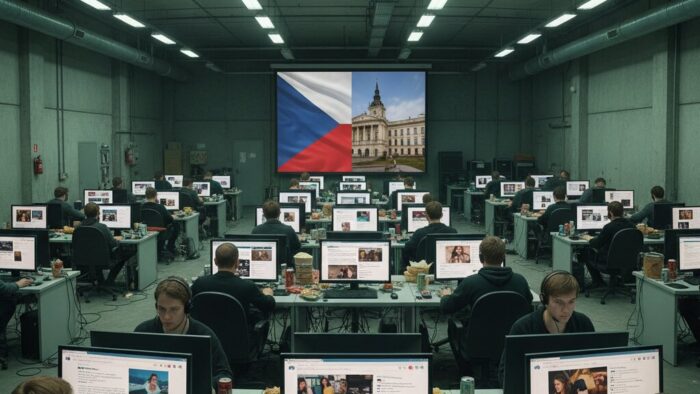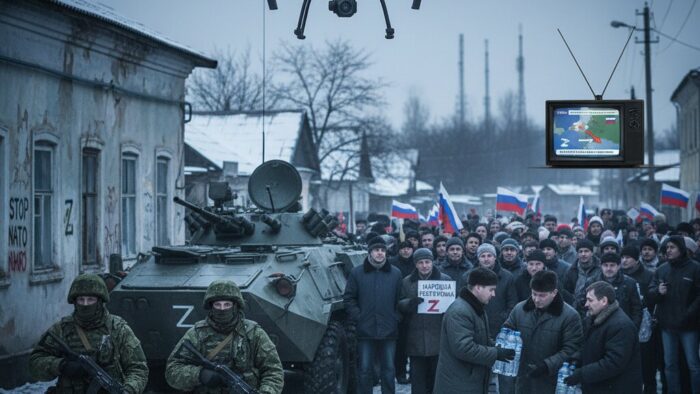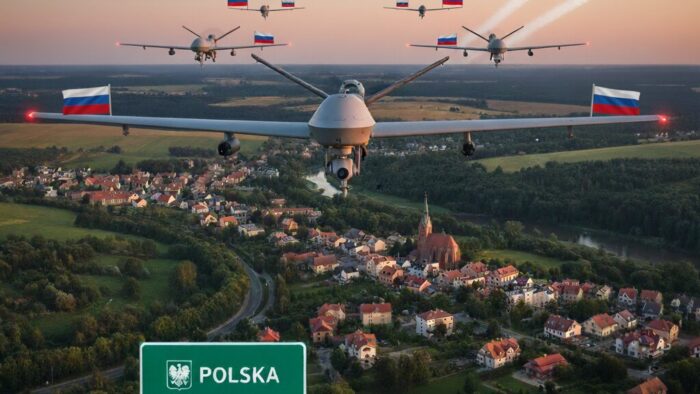NATO members are increasingly concerned about suspected hybrid attacks from Russia combining disinformation campaigns, cyberattacks, and drone harassment aimed at causing disruption to everyday life and damaging the morale of European citizens. On 15 October 2025, Euronews reported that Manfred Boudreaux-Dehmer, NATO’s first Chief Information Officer, warned that hybrid warfare has begun and these attacks are likely to become more frequent in the future. The article begins:
NATO members, especially those in Europe, are growing increasingly concerned about a wave of suspected hybrid attacks from Russia in recent months. They include cyberattacks, disinformation campaigns, and drone harassment. As part of this alleged interference, airports in countries including Denmark and Germany have been forced to shut down in recent weeks due to sightings of unidentified drones, causing significant delays for passengers. European officials say the aim is to cause disruption to everyday life and damage the morale of European citizens. In an interview with Euronews, Manfred Boudreaux-Dehmer, NATO’s first Chief Information Officer (CIO), estimates that these attacks are likely to become more frequent in the future.
Read more: https://www.euronews.com/2025/10/15/hybrid-warfare-has-begun-senior-nato-official-tells-euronews
Key Points
- European officials say Russia’s hybrid attacks, combining cyberattacks, disinformation campaigns, and drone harassment, aim to cause disruption to everyday life and damage the morale of European citizens.
- NATO’s Chief Information Officer stated the war of the future is no longer a kinetic war on the battlefield, with the alliance spending significant time and effort preparing for the hybrid war combining disinformation and technological threats.
- Boudreaux-Dehmer warned that technology is evolving and that adversaries will use new technical capabilities, including disinformation tools, requiring NATO to constantly prepare and respond to emerging hybrid threats.
- NATO established a new cyber defence centre in Belgium as a fundamental building block to ensure the alliance is increasingly prepared for cyber attacks and other types of hybrid warfare, including disinformation operations.
Russian Disinformation Operations Target European NATO Countries Through Hybrid Warfare
Russian disinformation operations targeting European NATO countries have intensified dramatically since 2022, employing sophisticated hybrid warfare tactics that combine cyber-enabled campaigns, social media manipulation, and political cultivation to destabilize democratic institutions across the alliance. Czech authorities documented tens of thousands of messages from sanctioned Russian websites flowing into the country, with disinformation outlets producing more daily articles than the nation’s largest media houses.
Poland experienced an unprecedented assault following a September 2024 drone incursion, as approximately 200,000 social media messages blamed Ukraine or NATO for the incident, demonstrating coordinated action between Russian military operations and information warfare. Germany faces particular vulnerability through the Alternative for Germany party, where 31 percent of Russian-Germans express support for the far-right movement that maintains systematic ties to Moscow through alleged espionage networks and financial channels.
Beyond electoral interference, Russia employs diverse operational methods across the alliance’s eastern flank. The Ghostwriter campaign exemplifies cyber-enabled influence operations, as state-sponsored actors targeted Lithuania, Latvia, and Poland with anti-NATO narratives through credential harvesting attacks against government, military, and media organizations. This technical sophistication extends to information laundering, where Kremlin-owned outlets amplified The Baltic Word, granting legitimacy to fringe disinformation sources previously lacking credibility.
The operations demonstrate long-term strategic cultivation, as organizations associated with Russian operative Yevgeny Prigozhin organized seemingly benign conferences on economic and environmental issues affecting Baltic states and Germany, representing textbook tradecraft that begins with politically uncontroversial topics before advancing Kremlin interests.
Italy presents a distinct case study in Russian penetration of NATO member states. An Italian Senate investigation found pro-Kremlin narratives in every middle school textbook analyzed, with recurring talking points on topics ranging from Donbas to Kiev’s history potentially shaping future generations’ worldviews. This educational infiltration complements a complex pro-Russian network involving social media, television, and newspapers designed to condition public opinion by attacking pro-Ukrainian politicians while supporting those advancing Moscow’s agenda.
The network includes parliamentarians, managers, lobbyists, and journalists, with mainstream television regularly featuring commentators potentially on Putin’s payroll. Far-right political parties serve as crucial vectors, as leaked recordings revealed Matteo Salvini’s Lega party associates discussing channeling tens of millions in Russian oil money through schemes negotiated at Moscow’s Metropol Hotel.
The Czech Republic’s experience illuminates how Russian operations exploit democratic vulnerabilities during critical electoral periods. State sources confirmed authorities were aware of ongoing law violations but lacked political will to intervene before parliamentary elections. This hesitation proved strategically consequential, as billionaire populist Andrej Babiš’s return to power represented a significant Russian influence victory.
Babiš’s ANO movement promised to end Czech support for Ukraine and abandon internationally recognized artillery shell procurement initiatives, positioning the new government alongside Hungary’s Viktor Orbán and Slovakia’s Robert Fico as leaders refusing military aid to Kyiv. Czech intelligence estimates that Russian operations control approximately 40 Czech-language websites presenting conspiracy theories and inaccurate reports designed to sow doubt about democratic governance.
Polish resilience against Russian interference demonstrates that determined countermeasures can significantly mitigate foreign manipulation despite massive operational investment. Although intelligence documented over 50 incidents linked to Russian interference during 2025 presidential elections, most Kremlin operations failed to resonate with voters who maintained 86 percent threat perception of Russia and 92 percent support for increased defense spending.
Twenty-two Polish-language Telegram channels with over 150,000 subscribers spread pro-Kremlin propaganda, including staged videos and false claims denying documented war crimes. However, Poland’s diversified social media landscape and comprehensive “election umbrella” strategy proved effective in protecting democratic processes, offering a template for other NATO members facing similar threats.
External References:
— NATO Review: Algorithmic invasions — How information warfare threatens NATO’s eastern flank
— Center for Strategic and International Studies: Russia’s Shadow War Against the West
— European External Action Service: 3rd EEAS Report on Foreign Information Manipulation and Interference Threats
Disclaimer:
The Global Influence Operations Report (GIOR) utilizes AI throughout the posting process, including the generation of summaries for news items, introductions, key points, and, often, the “context” section. We recommend verifying all information before use. Additionally, all images are generated using AI and are intended solely for illustrative purposes. While they represent the events or individuals discussed, they should not be interpreted as real-world photography.











